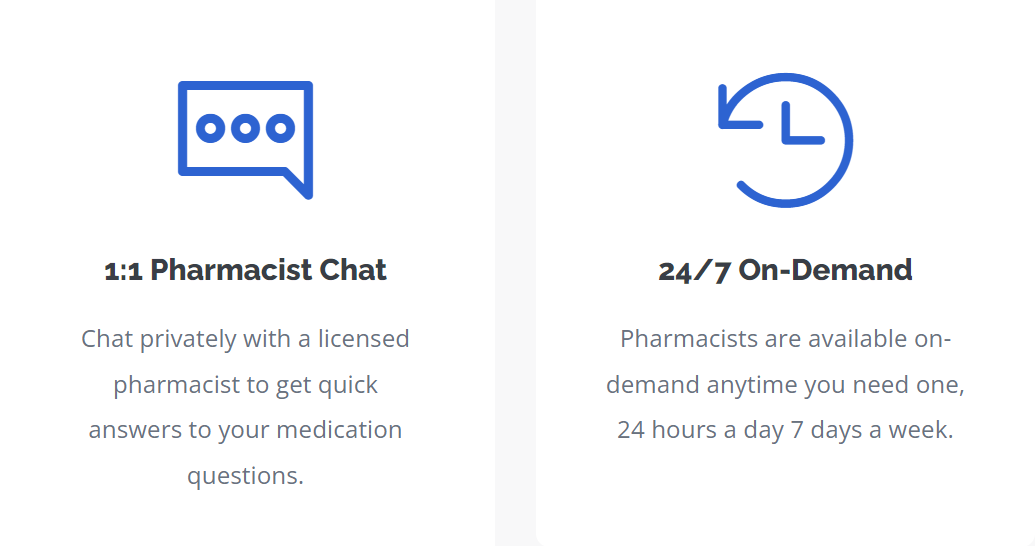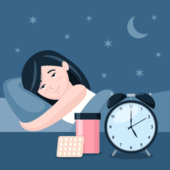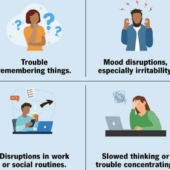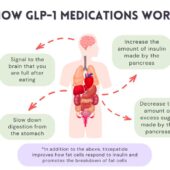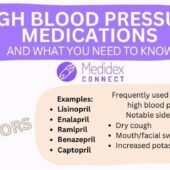Getting a good night’s sleep is essential for overall health and well-being. However, many people struggle with insomnia or other sleep disorders that make it difficult to fall asleep or stay asleep. Fortunately, there are several medications and supplements available to help improve sleep quality. In this comprehensive guide, we’ll explore the best medications for sleep, including how each type works, how to use them, their costs, and potential side effects.
After reading this guide, if you would like more information about the best medications for sleep or want to ask any other medication related questions, try out Medidex Connect to instantly connect with a pharmacist online.
Types of Medications and Supplements for Sleep
There are several categories of sleep aids, including prescription medications, over-the-counter (OTC) drugs, and natural supplements. Each type works differently and may be suitable for different individuals depending on their specific sleep issues and overall health. Several medications used to treat insomnia are also medications for anxiety and depression.
Prescription Sleep Medications
- Benzodiazepines
- Non-Benzodiazepine Sedative-Hypnotics (Z-Drugs)
- Melatonin Receptor Agonists
- Orexin Receptor Antagonists
- Antidepressants
1. Benzodiazepines
How They Work: Benzodiazepines work by enhancing the effect of the neurotransmitter gamma-aminobutyric acid (GABA) in the brain, which has a calming effect and helps induce sleep.
Examples:
- Temazepam (Restoril)
- Triazolam (Halcion)
- Estazolam (ProSom)
How to Use: Typically, benzodiazepines are taken 30 minutes before bedtime. They are usually prescribed for short-term use due to the risk of dependence and tolerance.
Cost: Generic versions can cost between $10-$50 for a month’s supply, while brand-name versions can be more expensive.
Side Effects:
- Drowsiness
- Dizziness
- Cognitive impairment
- Risk of dependence and withdrawal symptoms
2. Non-Benzodiazepine Sedative-Hypnotics (Z-Drugs)
How They Work: Z-drugs also enhance GABA activity but are chemically different from benzodiazepines, often resulting in fewer side effects.
Examples:
- Zolpidem (Ambien)
- Eszopiclone (Lunesta)
- Zaleplon (Sonata)
How to Use: These medications are usually taken right before bedtime. They are generally recommended for short-term use.
Cost: Generic versions can range from $15-$60 per month, with brand-name versions costing more.
Side Effects:
- Drowsiness
- Dizziness
- Sleepwalking
- Next-day impairment
3. Melatonin Receptor Agonists
How They Work: Melatonin receptor agonists mimic the action of melatonin, a natural hormone that regulates sleep-wake cycles.
Examples:
- Ramelteon (Rozerem)
How to Use: Ramelteon is typically taken 30 minutes before bedtime and can be used long-term without the risk of dependence.
Cost: Approximately $30-$60 per month for the brand-name version.
Side Effects:
- Dizziness
- Fatigue
- Hormonal effects (e.g., changes in prolactin levels)
4. Orexin Receptor Antagonists
How They Work: Orexin receptor antagonists block the action of orexin, a neurotransmitter that promotes wakefulness, thus helping to induce sleep.
Examples:
- Suvorexant (Belsomra)
- Lemborexant (Dayvigo)
How to Use: These medications are taken about 30 minutes before bedtime and can be used for both short-term and long-term treatment.
Cost: Generally, around $200-$400 per month, depending on the dosage and insurance coverage.
Side Effects:
- Next-day drowsiness
- Headache
- Dizziness
- Risk of sleep paralysis
5. Antidepressants
How They Work: Certain antidepressants have sedative properties that can help with sleep. They are often prescribed when insomnia is associated with depression or anxiety.
Examples:
- Trazodone
- Mirtazapine (Remeron)
- Doxepin (Silenor)
How to Use: These medications are usually taken before bedtime. Dosages can vary depending on the individual’s needs.
Cost: Generic versions are relatively inexpensive, ranging from $10-$30 per month.
Side Effects:
- Drowsiness
- Weight gain
- Dry mouth
- Constipation
Over-the-Counter Sleep Aids
- Antihistamines
- Melatonin Supplements
1. Antihistamines
How They Work: Antihistamines, commonly used for allergies, can have sedative effects that make them useful for short-term sleep problems.
Examples:
- Diphenhydramine (Benadryl)
- Doxylamine (Unisom)
How to Use: Taken 30 minutes to an hour before bedtime, these medications can help induce sleep.
Cost: Usually inexpensive, around $5-$15 for a bottle of 30 tablets.
Side Effects:
- Drowsiness
- Dry mouth
- Dizziness
- Next-day grogginess
2. Melatonin Supplements
How They Work: Melatonin supplements mimic the natural hormone melatonin, which helps regulate the sleep-wake cycle.
How to Use: Typically taken 30 minutes to an hour before bedtime, starting with a low dose (0.5-3 mg) and adjusting as needed.
Cost: Around $5-$20 per bottle, depending on the brand and dosage.
Side Effects:
- Drowsiness
- Headache
- Dizziness
- Short-term feelings of depression
Natural Supplements
- Valerian Root
- Chamomile
- Lavender
- Magnesium
1. Valerian Root
How It Works: Valerian root is an herbal supplement that may help increase GABA levels in the brain, promoting relaxation and sleep.
How to Use: Typically taken 30 minutes to an hour before bedtime, with doses ranging from 300-600 mg.
Cost: Around $10-$20 per bottle.
Side Effects:
- Dizziness
- Stomach upset
- Dry mouth
2. Chamomile
How It Works: Chamomile is often consumed as a tea and has mild sedative effects that can help with relaxation and sleep.
How to Use: Drink a cup of chamomile tea about 30 minutes before bedtime.
Cost: Generally inexpensive, around $5-$10 for a box of tea bags.
Side Effects:
- Allergic reactions in some individuals
- Stomach upset (rare)
3. Lavender
How It Works: Lavender is known for its calming and relaxing properties, often used in aromatherapy to promote sleep.
How to Use: Use lavender essential oil in a diffuser or apply a few drops to your pillow before bedtime.
Cost: Around $10-$20 for a bottle of essential oil.
Side Effects:
- Skin irritation (when applied directly without dilution)
4. Magnesium
How It Works: Magnesium is a mineral that can help relax muscles and improve sleep quality.
How to Use: Taken as a supplement (200-400 mg) about 30 minutes before bedtime.
Cost: Around $10-$20 per bottle.
Side Effects:
- Stomach upset
- Diarrhea (at high doses)
Choosing the Right Sleep Aid
When selecting a sleep aid, it’s important to consider your specific sleep issues, overall health, and any potential interactions with other medications you may be taking. Here are some tips for choosing the right sleep aid:
- Consult Your Healthcare Provider: Before starting any sleep medication or supplement, consult with your healthcare provider to ensure it’s safe and appropriate for your condition.
- Consider Short-Term vs. Long-Term Use: Some sleep aids are better suited for short-term use, while others can be used long-term. Discuss your options with your healthcare provider.
- Start with the Lowest Effective Dose: Always start with the lowest effective dose to minimize potential side effects.
- Monitor for Side Effects: Pay attention to any side effects and report them to your healthcare provider. They may need to adjust your dosage or recommend a different medication.
- Combine with Good Sleep Hygiene: Medications and supplements are most effective when combined with good sleep hygiene practices, such as maintaining a regular sleep schedule, creating a relaxing bedtime routine, and avoiding caffeine and electronic devices before bed.
Conclusion
There are various medications and supplements available to help improve sleep quality. From prescription medications like benzodiazepines and non-benzodiazepine sedative-hypnotics to over-the-counter options like antihistamines and melatonin supplements, each type has its own benefits, costs, and potential side effects. Natural supplements such as valerian root, chamomile, lavender, and magnesium can also be effective for promoting relaxation and sleep. By consulting with your healthcare provider and considering your specific needs, you can find the right sleep aid to help you get a restful night’s sleep and improve your overall health and well-being.
You can also ask a licensed pharmacist online about your sleep medication related questions for quick and convenient personalized answers.
Disclaimer: This website does not provide medical advice. No content on this site is intended to be a substitute for professional medical advice, diagnosis, or treatment. All content on this site is for educational and informational purposes only, does not constitute medical advice, and does not establish any kind of patient-provider or client-professional relationship by your use of this website. Although we strive to strictly provide accurate and up to date general information, content available on this site is not a substitute for professional medical advice, and you should not rely solely on the information provided here. Always seek the advice of your physician or other qualified healthcare provider with any questions you may have regarding medical conditions, treatments, or medications.




